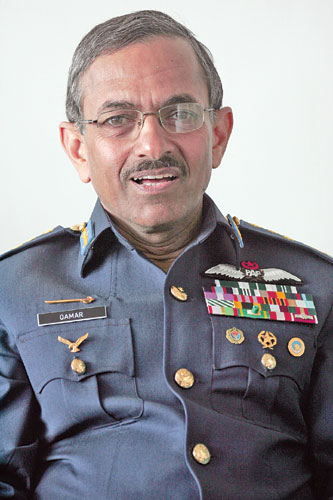Pakistan seeks closer military ties with China
Pakistan is interested in buying more defense systems and equipment from China, and hopes to deepen cooperation to upgrade its armed forces, a top Pakistan Air Force officer said on Wednesday.?
 |
|
Rao Qamar Suleman is Pakistan Air Force Chief of Air Staff. |
Air Chief Marshal Rao Qamar Suleman told China Daily that Pakistan is evaluating, among other options, three or four Chinese surface-to-air missiles including the advanced "HQ-18".
Jane's Defence News, a publication that specializes in military topics, reported that China was building the Hong Qi-18 (HQ-18) missile system based upon the Russian S-300V1 type 2 (SA-12A "Gladiator"), presumably under a license agreement. But this has not been confirmed by the Chinese military.
The missiles, with a maximum range of 100 km, can be used against short-range ballistic missiles, aircraft or cruise missiles, with intercepts taking place between a low-level 25 meters and an altitude of 25 kilometers, according to Jane's.
Suleman also said China had completed the first of four Chinese ZDK-03 airborne warning and control system (AWACS) aircraft for the Pakistan Air Force on Nov 13.
"The delivery to Pakistan will start in the early part of next year," said Suleman, who is also chief of the air staff of the Pakistan Air Force.
He said the Pakistan Air Force was also looking at the option of purchasing Chinese engines, though any final decision will depend on the engines' quality.
Suleman brought FC-1 (Fighter China-1) Xiaolong aircraft, an improved version of China's new generation fighter jet co-developed with Pakistan, to the China International Aviation and Aerospace Exhibition in Zhuhai.
Military research and development cooperation with China will continue not only in aircraft production, but also "in other areas", he said.
The Pakistan Air Force is increasing production docks for the FC-1 (named the JF-17 Thunder in Pakistan) from four to six, and is aiming to have about 25 aircraft assembled by the end of the year.
"It's on a very fast track, and there is no other fighter aircraft anywhere in the world," which has been produced so quickly, he said.
China and Pakistan have traditionally had close military relations, and Suleman said bringing FC-1 Xiaolong aircraft to Zhuhai is to display "solidarity with China" and "to show to the world that we have a tremendous amount of respect and love for our Chinese friends".
Commenting on cooperation in military research and development, he said China and Pakistan "will continue working together".
"There is no shortage of trust and no shortage of will. There will be more projects developed successfully."
Peng Guangqian, a Beijing-based military strategist, noted Beijing's weapons deal with Islamabad had almost no effect on the balance of military power between Pakistan and India, especially given the multi-billion dollar defense deals signed between the United States and India during Obama's visit.
The China-Pakistan deals should not be a cause of alarm for other countries, he said referring to foreign media reports that the FC-1 was a concern for the Indian Air Force.
Sun Shihai, director of the Center for South Asian Studies under the Chinese Academy of Social Sciences, added that Obama also promised India that the US would give it easier access to high-tech equipment for both civilian and military use.
Despite the huge gap between the Pakistani and Indian military forces, especially in terms of conventional weapons, the situation in the region is basically balanced given the fact that both countries have nuclear weapons, he said.
 0
0 






